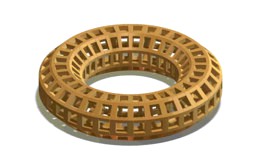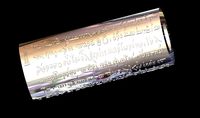GrabCAD

MAZZOCCHIO in Codex Atlanticus
by GrabCAD
Last crawled date: 1 year, 11 months ago
https://youtu.be/oZ_oBGZNJbE
https://www.leonardo3.net/mazzocchio/index.html#001
We know that da Vinci used the inspired Vitruve proportions reporting and Fibonacci. In seeking to draw more fidèment possible Mazzocchio Leonardo, I sized octagonal section number of the Golden Fibonacci spiral from the outer diameter.
Feuillet 710 r du Codex Atlanticus
I propose to make a puzzle inspired this drawing of Leonardo. I find it interesting that this piece could be printed in one block or in parts to nest in 3D, with a maximum of 512 elements.
In the sheet 710 r of the Codex Atlanticus Leonardo draws a Mazzocchio, but what is really his intent? Leonardo goes well beyond the simple (and actually complex) representation of the object. His intention is to create a real Mazzocchio, wax or lead. The design of Mazzocchio is in a central perspective view designed impeccably, with care and with a detail far superior to that of his predecessors and contemporaries. It 'clear that Leonardo was completely master of perspective technique and how he knew, probably better than anyone else, this practice. The design of the Leonardo Mazzocchio is perfect because rich in details absent in the representations of his predecessors; for example if they even grasp the hidden sides. Leonardo fact not only draws the volume and external surfaces, but also the faces and internal edges.
In design it uses a very common trick: draws only half of the solid, for faithfully maintaining the second using the trick of the small holes on the sheet, and avoid wasting time in a symmetrical design that without this approach, it would not be so perfect.
The Mazzocchio is not the only solid complex of interest to Leonardo. The Atlantic Codex is full of other examples. Leonardo was so skilled in this type of representations that the mathematician Luca Pacioli (1445-1517) commissioned the designs of the famous treatise De Divina Proportione (1497).
The printing of identical parts 32, offers the possibility of various assemblies.
https://www.leonardo3.net/mazzocchio/index.html#001
We know that da Vinci used the inspired Vitruve proportions reporting and Fibonacci. In seeking to draw more fidèment possible Mazzocchio Leonardo, I sized octagonal section number of the Golden Fibonacci spiral from the outer diameter.
Feuillet 710 r du Codex Atlanticus
I propose to make a puzzle inspired this drawing of Leonardo. I find it interesting that this piece could be printed in one block or in parts to nest in 3D, with a maximum of 512 elements.
In the sheet 710 r of the Codex Atlanticus Leonardo draws a Mazzocchio, but what is really his intent? Leonardo goes well beyond the simple (and actually complex) representation of the object. His intention is to create a real Mazzocchio, wax or lead. The design of Mazzocchio is in a central perspective view designed impeccably, with care and with a detail far superior to that of his predecessors and contemporaries. It 'clear that Leonardo was completely master of perspective technique and how he knew, probably better than anyone else, this practice. The design of the Leonardo Mazzocchio is perfect because rich in details absent in the representations of his predecessors; for example if they even grasp the hidden sides. Leonardo fact not only draws the volume and external surfaces, but also the faces and internal edges.
In design it uses a very common trick: draws only half of the solid, for faithfully maintaining the second using the trick of the small holes on the sheet, and avoid wasting time in a symmetrical design that without this approach, it would not be so perfect.
The Mazzocchio is not the only solid complex of interest to Leonardo. The Atlantic Codex is full of other examples. Leonardo was so skilled in this type of representations that the mathematician Luca Pacioli (1445-1517) commissioned the designs of the famous treatise De Divina Proportione (1497).
The printing of identical parts 32, offers the possibility of various assemblies.
Similar models
grabcad
free

Mortar from Codex Atlanticus Leonardo da Vinci
...m codex atlanticus leonardo da vinci
grabcad
mortar from atlantic codex (codex atlanticus) by leonardo da vinci
work in progress
free3d
$25

Portal
...portal
free3d
portal, leonardo da vinci, codex atlanticus / 0050r.
textures and materials included only sim, fbx and obj format.
grabcad
free

Leonardo da Vinci Self Supporting Bridge
... self supporting bridge in the codex atlanticus folio 69ar, when researching the cannon, so i modelled to add to the new website.
3dwarehouse
free

self supporting Bridge, Leonardo da Vinci
...self supporting bridge, leonardo da vinci
3dwarehouse
codex atlanticus folio 69 #3d_challenge_238 #leonardo_da_vinci
grabcad
free

Mazzocchio
... even what the word "mazzocchio" means..lol. this is another design sketched by leonardo. i thought it looked awesome.
grabcad
free

Drill with self centring chuck
...ave developed a 3d model from the the sketch, some changes were made to the original to make it a little more practical to build.
grabcad
free

Da Vinci Morta
...od quality.
abs is the material used in this project.
http://www.stratasys.com/materials/fdm
thank you to stratasys and grabcad.
grabcad
free

sheet metal parts
...ex to look but too easy to model.
i have added drawings too for 2 parts.
made them by drawings of cad cam tutorial link provided.
grabcad
free

Da Vinci Bicycle Model
...i am sure he would have made it very similar to this design. i hope you enjoy. - c....
cg_trader
$10

Leonardo Da Vinci Drawings Collection in frame
...ngs collection in frame
cg trader
collection of drawings made by leonardo da vinci.
in a dark frame with a glass sheet in front.
Mazzocchio
grabcad
free

Mazzocchio
... even what the word "mazzocchio" means..lol. this is another design sketched by leonardo. i thought it looked awesome.
3dwarehouse
free

mazzocchio
...mazzocchio
3dwarehouse
mazzocchio en arêtes 8 faces 16 tronçons #paolo_uccello_flood #tore
3dwarehouse
free

Mazzocchio
...mazzocchio
3dwarehouse
Atlanticus
thingiverse
free

Glaucus atlanticus
...glaucus atlanticus
thingiverse
glaucus atlanticus
thingiverse
free

Blue Dragon (Glaucus Atlanticus) by SpaceLord87
...ingiverse
blue dragon (glaucus atlanticus) sculpted in zbrush. took me a long time to sculpt please post a make if you print it!
thingiverse
free

Glaucus atlanticus - Model - Pendant 3D - Blue Angel by Alajaz
...ts own tissues as defense against predation. humans handling the slug may receive a very painful and potentially dangerous sting.
free3d
$25

Portal
...portal free3d portal, leonardo da vinci, codex atlanticus / 0050r. textures and materials included only sim, fbx...
thingiverse
free

The Glaucus: A soft robot quadruped by gianteye
...the glaucus, named after the blue sea slug (glaucus atlanticus, is an open source soft robotic quadruped from super-releaser...
grabcad
free

Glaucus atlanticus
...glaucus atlanticus
grabcad
the model is based on a sea creature called glaucus atlanticus
cg_trader
$24

Glaucus atlanticus
...atlanticus
cg trader
3d model glaucus atlanticus, available formats max, obj, fbx, ma, mb, animal, ready for 3d animation and ot
cg_trader
$75

Glaucus atlanticus necklace low poly
...laucus atlanticus necklace low poly
cg trader
https://www.cgtrader.com/3d-models/animals/fish/glaucus-atlanticus-rigged-low-poly
grabcad
free

Mortar from Codex Atlanticus Leonardo da Vinci
...m codex atlanticus leonardo da vinci
grabcad
mortar from atlantic codex (codex atlanticus) by leonardo da vinci
work in progress
cg_trader
$2

Blue Dragon Glaucus atlanticus
...
a 3d model of a sea slug known commonly as a blue dragon. the .zip file includes textures (diffuse, normal and shininess maps).
Codex
3ddd
free

Molteni Codex Table
... codex , обеденный
molteni codex dining table including vray materials and maps
turbosquid
$18

Codex Rotary
...squid
royalty free 3d model codex rotary for download as stl on turbosquid: 3d models for games, architecture, videos. (1439894)
turbosquid
$5

Codex Ebnerianus
...d
royalty free 3d model codex ebnerianus for download as stl on turbosquid: 3d models for games, architecture, videos. (1439823)
3ddd
$1

Molteni CODEX
...le is completed by an elm wood rectangular
top, which underscores the outstanding personality and natural features of the design.
3d_export
$25

Nismo Rim 3D Model
...dodge car speed drift sport nismo rim 3d model codex 57969...
3d_export
$20

Lamborghini Murcielago Wheel 3D Model
...tyre velocity car exotic lamborghini murcielago wheel 3d model codex 57760...
3d_export
$10

Dodge Viper Emblem 3D Model
...car american snake logo dodge viper emblem 3d model codex 57961...
3d_ocean
$5

Book
...book 3docean 3d album architecture book c4d codex compendium detailed edition encyclopedia folio handbook hardcover layflat magazine...
3d_ocean
$9

Book
...book 3docean 3d album book c4d codex compendium detailed edition encyclopedia folio handbook hardcover layflat magazine...
3ddd
free

Molteni, Mackintosh and some glass
...items from various manufacturers. the set consists of: molteni codex table, rennie mackintosh hillhouse chair, seletti twitable tray and...
